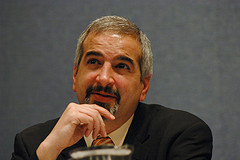I took this behind the Northshore Unitarian Universalist Church in Danvers less than an hour ago. Send in the sled dogs!
Month: February 2012 Page 1 of 3
 One of the more fun things I got to do during my years at the Boston Phoenix was drive to Augusta one weekend in 1999 to meet Maine’s senators, Olympia Snowe and Susan Collins, at a motorcycle rally. I started thinking about that story following Snowe’s announcement that she won’t seek re-election.
One of the more fun things I got to do during my years at the Boston Phoenix was drive to Augusta one weekend in 1999 to meet Maine’s senators, Olympia Snowe and Susan Collins, at a motorcycle rally. I started thinking about that story following Snowe’s announcement that she won’t seek re-election.
My article, by the way, appeared in the debut issue of the Portland Phoenix, which is still going strong more than a dozen years later. When you visit Portland (one of my favorite cities), you should be sure to pick up a copy.
Snowe’s career harks back to a time when there was such a thing as liberal Republicans and conservative Democrats. Nonideological partisan politics had its shortcomings, but it did tend to minimize the gridlock and enmity that characterizes the national dialogue today.
Snowe’s announcement will also reduce the ranks of moderate New England Republican senators to just two: Collins and Scott Brown of Massachusetts. And that’s assuming Brown wins re-election this November against his Democratic challenger, Elizabeth Warren.

Blast from the past: the Hudakmobile, circa 2009
Far-right Republican politico William Hudak’s recent announcement that he was abandoning a congressional race in order to get involved in a multi-level marketing operation was amusing enough. But the comedy factor increased exponentially Tuesday when Julie Manganis reported in the Salem News that Hudak’s new business partner had pleaded guilty to promoting prostitution.
Albert Muir and his then-wife, Manganis writes, ran a “health spa” in Branford, Conn., called Marlow’s, which was shut down by authorities in late 2009. Muir, who is also described as a professional poker player, is serving a five-year suspended sentence. He told the News that he pleaded guilty because he was afraid his then-wife, who was seeking a divorce, would send him up the river.
Here is Marcia Chambers’ Branford Eagle account of the police raid of Dec. 2, 2009, which came about in part because Marlow’s openly advertised its services on Craigslist. Chambers reported that police considered the spa to be “a full-scale prostitution ring.” Muir’s then-wife, Jazmin Benavides, is named in the article, but Muir is not, although Mark Zaretsky of the New Haven Register identified Muir as the co-owner. Chambers told me by email yesterday that Muir was arrested and charged in March 2010 after police conducted a follow-up investigation.
Hudak says he didn’t know nothin’ about nothin’. As Manganis notes, Hudak made much of the legal woes facing Democratic congressman John Tierney’s family when he ran against him two years ago. Tierney’s wife, Patrice Tierney, ended up doing time for her role in what federal authorities described as an offshore money-laundering operation run by her brother. But Hudak tells the News that “I think you’re really stretching” when he was asked whether he should have known about his new BFF’s legal woes.
When Hudak ran against Tierney in 2010, he achieved notoriety for putting up posters on his Boxford property comparing then-candidate Barack Obama to Osama bin Laden and for questioning whether Obama was born in the United States — although he denied that he actually believed Obama was not an American citizen.
Hudak also claimed the day after Scott Brown’s victory over Martha Coakley in the 2010 U.S. Senate special election that Brown had endorsed him in the Republican primary. Brown’s office denied it, but then endorsed Hudak over Tierney that fall.
Unfortunately for Tierney, he won’t get to run against Hudak again. This time, the leading candidate for the Republican nomination is former state senator Richard Tisei of Wakefield, who was Charlie Baker’s running mate in the gubernatorial election in 2010.
Tisei is a smart, personable moderate. Combined with Tierney’s family issues, the North Shore probably represents the Republicans’ best chance to pick up a congressional seat in Massachusetts this fall.
I have figured out why there is a disparity between the U.S. Senate fundraising numbers in Brian Mooney’s Boston Globe story today and in the chart that accompanies his story. It involves the difference between itemized contributions (those of $200 or more) and non-itemized contributions. (My earlier item.)
Mooney’s story mentions it, but it’s unclear from the context what the significance is. Now I understand it, thanks to some labeling that’s been added to the chart since this morning. The Globe’s metro editor, Jen Peter, walked me through it as well.
I’ll explain this with the numbers reported for Sen. Scott Brown’s Democratic challenger, Elizabeth Warren. Warren reported raising $5.7 million in the fourth quarter of 2011. That number comprises both itemized and non-itemized contributions. Mooney reported that 61.3 percent of Warren’s itemized contributions were from out of state.
Now let’s turn to the chart, to which the phrase “Itemized donations available from FEC” was appended sometime after my first post. Here we learn that Warren raised $1.2 million in itemized in-state contributions during the fourth quarter and $1.9 million in itemized out-of-state contributions. That’s a total of $3.1 million. And yes, $1.9 million is 61.3 percent of $3.1 million.
What you can’t do, as I did earlier today, is take that 61.3 percent and apply it to Warren’s $5.7 million total. That’s because $2.6 million of that total is non-itemized, and thus there’s no way of knowing how much came from out of state and how much came from Massachusetts residents.
Bottom line: Brown beat Warren in itemized, in-state contributions by a margin of $1.5 million to $1.2 million. And we just have no way of knowing with respect to non-itemized contributions of less than $200.
Both Mooney’s story and the chart are accurate, but they are reporting different facts. Mooney does not mention Brown and Warren’s itemized totals; the chart does not mention their overall totals.
Much ado about not much? Yes. But it was a puzzle, and it reached a point where I was determined to solve it. So there you go.
I’ve written a piece for the Nieman Journalism Lab about the New Haven Independent’s decision to suspend online comments. The move, by Independent founder and editor Paul Bass, is pretty dramatic, as his site is often looked to as a model for how to handle comments the right way. An excerpt:
So should the comments resume? I think they have to — they’re too integral a part of the Independent’s identity. Civic engagement has been on the wane for years, and it’s not enough for journalism merely to serve the public. As I wrote for The Guardian in 2009, news organizations need to recreate the very idea of a public by encouraging a sense of involvement and participation. At least until recently, the Independent did a remarkable job of doing just that. But clearly something changed.
 So which U.S. Senate candidate is raising more money from Massachusetts residents? The Republican incumbent, Scott Brown, or his Democratic challenger, Elizabeth Warren?
So which U.S. Senate candidate is raising more money from Massachusetts residents? The Republican incumbent, Scott Brown, or his Democratic challenger, Elizabeth Warren?
The emphasis in today’s Boston Globe story by Brian Mooney is on Warren’s out-of-state fundraising prowess. But I thought it would be interesting to dive a little deeper into the numbers. What I discovered is that either someone at the Globe is math-impaired — or that my own dubious math abilities have led me astray.
Let’s start, as I did, with Mooney’s story, which tell us that (1) Warren raised $5.7 million in the fourth quarter of 2011, 61.3 percent of it from out of state; and (2) Brown raised $3.2 million, 66 percent of it from inside the Bay State. By those numbers, Warren raised $2.2 million in Massachusetts and Brown raised $2.1 million. That would mean Warren isn’t just a national fundraising phenomenon, but she’s also doing better than Brown where it really matters.
But wait. After I read the story, I took a look at the bar graph accompanying it — and was informed (misinformed?) that Brown had raised $1.5 million in Massachusetts during the fourth quarter compared to just $1.2 million for Warren. The overall fundraising totals in the graph are much lower than what’s in Mooney’s story, so there’s clearly an apples-and-oranges problem somewhere.
But what is the problem? I’m not sure. Neither the story nor the chart explains the disparity. We’re talking about math, so I don’t rule out the possibility that there’s a simple explanation staring me right in the face. Any thoughts?
Last month I praised Sen. Scott Brown for his quick response to those of us who signed an online petition opposing draconian anti-piracy bills being considered by Congress. On Monday, I heard from Sen. John Kerry as well. Here’s what he wrote:
Dear Dan:
Thank you for your letter regarding the Preventing Real Online Threats to Economic Creativity and Theft of Intellectual Property Act (PROTECT IP Act). I appreciate hearing from you on this important issue.
I have long championed the cause of innovation and an open Internet. Firms operating on and off the Internet strongly rely on intellectual property laws to help protect their investments and ensure a just return for their goods and services. Online piracy and copyright infringement hurts our economy and costs American businesses more than 200 billion dollars a year. Many infringers operate from foreign countries in order to avoid US law enforcement. As a result, under current law, American authorities are limited in what they can do to bring these rogue sites to justice.
As you know, the PROTECT IP Act was intended to protect American businesses from intellectual property theft on foreign websites. Among other things, the bill would provide the Attorney General with the authority to seek a court injunction against a foreign website that engages in copyright infringement. The court could also require U.S. websites to block access to websites found to be dedicated to infringing activities. For example, search engines could be required to disable links to the website that is found to be violating copyright of a US company.
However, there are a number of serious and legitimate concerns regarding the scope of the legislation, as well as the potential for abuse, censorship, or other unintended consequences. The authors recognize the legislation still needs work and I will oppose any proposal that would fundamentally undermine or impede the ability of people to communicate, compete, and innovate using the Internet.
I am pleased that Majority Leader Reid has indefinitely postponed Senate consideration of the PROTECT IP Act, and I will continue to review and work to improve legislation to both protect the intellectual property of American businesses and to ensure the web remains free and open. As I consider proposals to address these issues, I will keep your views in mind.
Thank you again for contacting me on this topic. Please don’t hesitate to reach me again on this or any other issue in the future.




New Haven Independent reboots its comments engine
By Dan Kennedy
On February 20, 2012
In Media
Following a hiatus of nearly two weeks, the New Haven Independent has brought back reader comments — with new rules that founder and editor Paul Bass hopes will restore civility. Here’s my latest for the Nieman Journalism Lab.